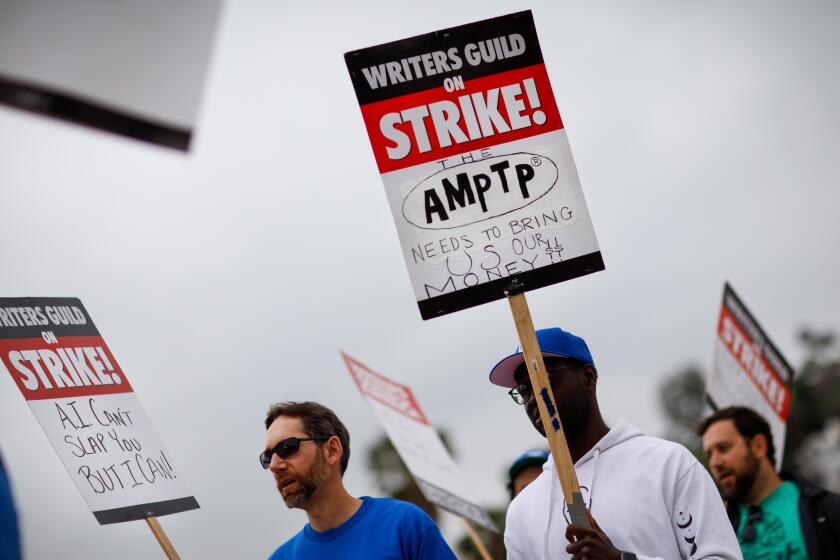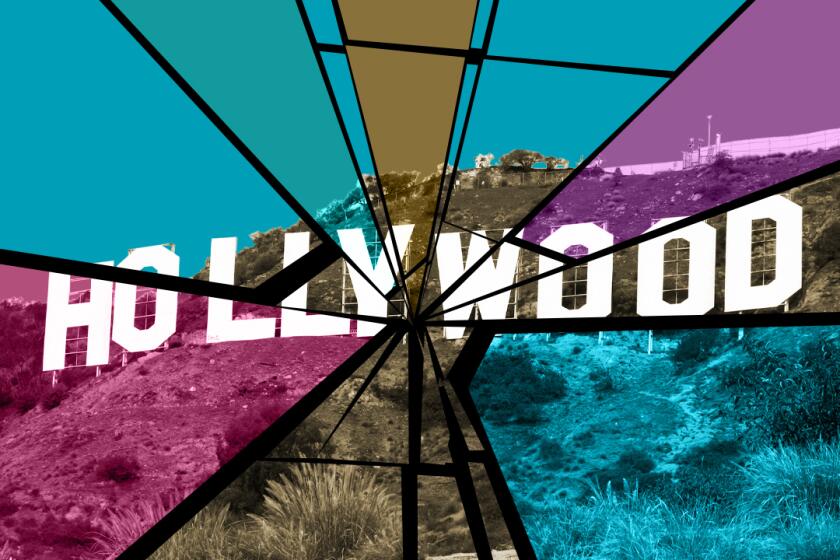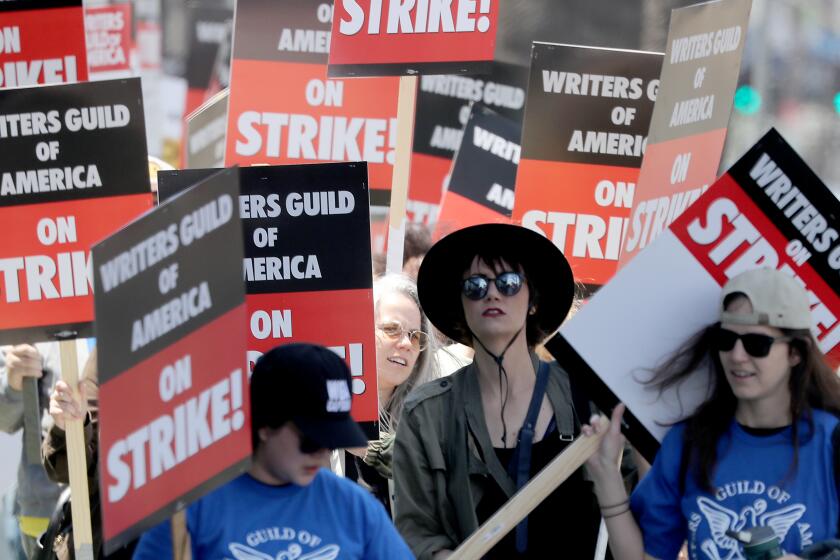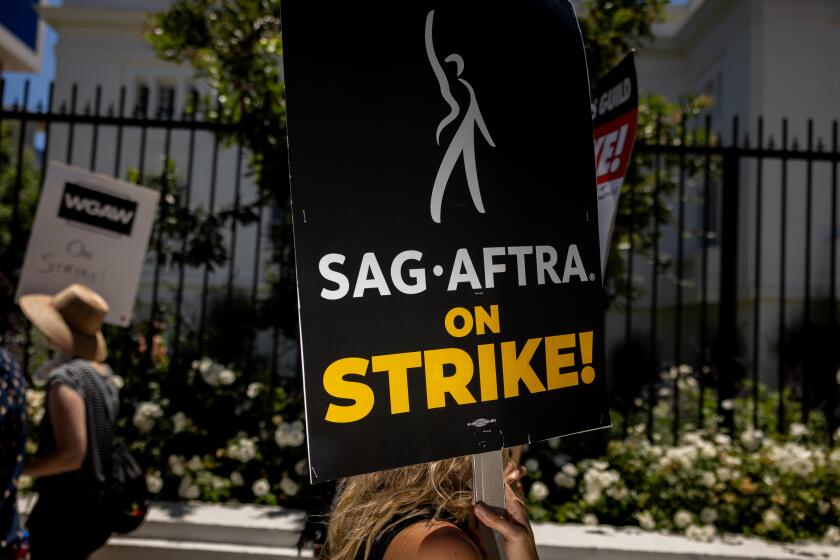Striking Black screenwriters fear the job market will shrink
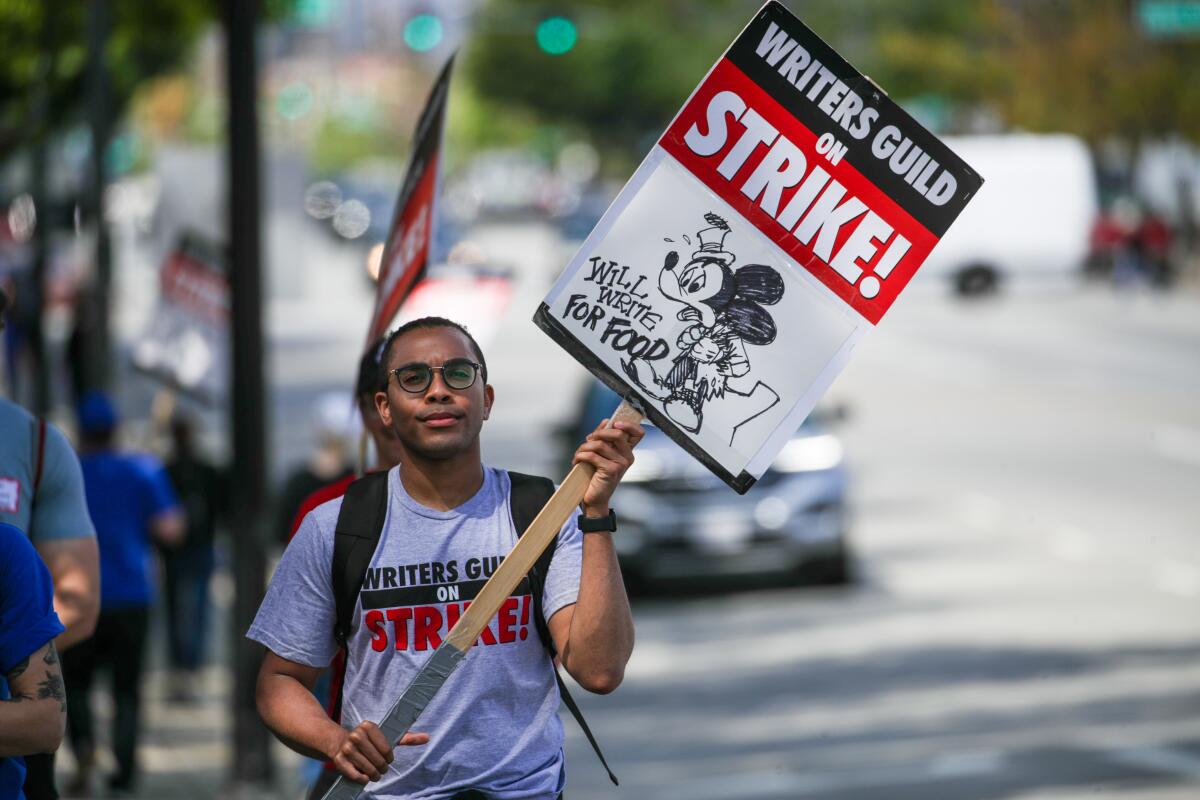
- Share via
As co-chair of the Writers Guild of America West’s Committee of Black Writers, Hilliard Guess mentors young writers and first-time scribes as they navigate Hollywood.
“Sometimes I meet these writers out on the picket lines and walk with them and talk them through how to survive,” says Guess. “And when we come out of this, it’s going to be better for them, better than it was for me and all of us coming up.”
But many of these writers, who joined writing staffs in 2023 only to have their dreams delayed, aren’t convinced. They are “scared to death” about what their future will look like after the writers’ strike — now well into its fifth month — ends, Guess said. Leaders from the WGA and the major studios resumed negotiations this week amid signs of progress toward a possible deal. Actors joined them on the picket lines in mid-May.
“I think a lot of people aren’t going to be coming back to the jobs that they had before this went down,” says Guess.
That sense of uneasiness is widely shared among Black writers. Like most WGA members, many remain supportive of the strike, but they also fear there will be a contraction of projects that will disproportionately affect them once Hollywood gets back to work.
“You were already seeing something that felt like a trend within the business, which was some of the diverse projects either not moving forward when they should have, or being canceled when they shouldn’t have,” says Ben Watkins, WGA member and executive producer, writer and showrunner behind the TV series “Hand of God” and “Cross,” an upcoming TV series based on James Patterson’s Alex Cross novels.
“There’s a track record of when there are disruptions within the industry and the industry starts to figure out who they are again — that writers of color and diversity-driven projects seem to disproportionately suffer,” Watkins adds.
WGA and AMPTP representatives met for the second time this week as the two sides worked on an agreement that would end the writers’ strike.
Even before the strikes began, Hollywood seemed to be retreating from commitments to diversity, equity and inclusion, as evidenced by the cancellation of diverse shows and the fact that several top-level DEI executives have been unceremoniously laid off at major studios.
After the murder of George Floyd, Guess and his colleagues published an open letter to Hollywood demanding that studios and producers be held accountable for their public pledges to diversify hiring and content.
“What I want[ed] to see is in three years, are we in that same cycle? To be honest, from what I’ve seen now three years later, they started letting go all of the DEI people,” says Guess. “That’s a clear sign that we’re the first to go.”
Hollywood is dysfunctional. Does it behave like a monopoly? The WGA’s public policy expert discusses Disney, Netflix and Amazon’s grip on the entertainment industry and how vertical integration hurts artists and consumers.
After the 2007-08 writers strike, which lasted 100 days, opportunities seemed to open up for Black writers and showrunners. Diversity was pushed as television expanded with reality shows and more streaming options emerged, creating a growing appetite for niche programming.
“That television boom — probably around 2015, 2016 — kind of forced the industry to give new showrunners an opportunity. They were younger, more forward-thinking. Has it created way more opportunities for us Black writers? 1,000%,” says Jameal Turner, writer and co-executive producer on The CW’s “All American.”
By 2020, African Americans made up 15.5% of all TV series writers and 6.9% of all film screenwriters. Many of these gains were driven by that TV expansion, the hiring of diversity executives and a certain mindset toward inclusion.
This expansion, though, also helped create the seeds of the current conflict, as writers felt shortchanged by the streaming boom.
The 2023 writers’ strike is over after the Writers Guild of America and the Alliance of Motion Picture and Television Producers reached a deal.
“I think everyone has agreed there was too much TV being made and that was all done in the name of more subscribers,” says Malcolm Spellman, writer-creator on “The Falcon and the Winter Soldier” and “Bel-Air” and co-producer on “Empire.”
Spellman is also the writer of Marvel Studios’ upcoming “Captain America: Brave New World.” He’s seen how an abundance of writers in the film ecosystem limits opportunities for writers of color when the business contracts and fears that TV is on the same path.
“It’s not about diabolical plans,” says Spellman. “It was that the ship was tipping over and they weren’t trying to save no one else, which I get. But the end result is [Black writers] never penetrated features, and there was never any moving, meaningful impact on diversity. If you apply that to what’s about to happen in TV, it’s not nuts to assume the same survival instincts will kick in.”
Established Black writers are fighting diminished opportunities not only for themselves but for those who are entering the industry.
The makeup of writers’ rooms has been of particular concern. Traditionally, such rooms have provided invaluable experience to emerging writers. But as those rooms have shrunk in size in the streaming era, the opportunities for writers of color have diminished.
Although the WGA is attempting to restrict the use of so-called mini-rooms, many Black writers are skeptical they will go away.
“It would be hard to [enact the NFL’s Rooney Rule] in film and TV because there’s so many reasons that somebody would have as to why you need this writer over that writer. They can come up with all kinds of excuses,” says Guess. “They’re going to still leave it up to the showrunners. You’re going to still go to your friends, and your friends tend to be around your level.”
TikTok, YouTube and other social media platforms have democratized who gets to be an entertainer. So why do some web creators still go the old-school route and attend film or acting school?
Rasheed Newson, an executive producer and co-developer of “Bel-Air,” adds that studios have been asking productions to get by with fewer writers.
“They’re essentially saying to us, you had a writing staff of 10, couldn’t you get by with four?” he says. “Everything at this point is so efficient, everything’s been cut to so many bare bones, the only thing left to squeeze are people.”
Talicia Raggs, writer and co-executive producer on “The Equalizer” and “NCIS: New Orleans,” was one of those who felt the squeeze.
She struggled after the 2007 strike, not working for almost three seasons, and understands the hardships a work stoppage can bring.
The mini-rooms are one obstacle for everyone, but with new Black writers, she says there are even more barriers to getting good writing jobs.
“My main fear for the younger writers coming up — when they’re already being squeezed [by a scarcity of jobs] — is the mini rooms. People are going to try to make their seasons, so [locking out younger writers] has the potential to happen to a greater degree once everyone comes back,” she says.
SAG-AFTRA has approved a deal from the studios to end its historic strike. The actors were on strike for more than 100 days.
Times Staff Writer Wendy Lee contributed to this report.
More to Read
Inside the business of entertainment
The Wide Shot brings you news, analysis and insights on everything from streaming wars to production — and what it all means for the future.
You may occasionally receive promotional content from the Los Angeles Times.
